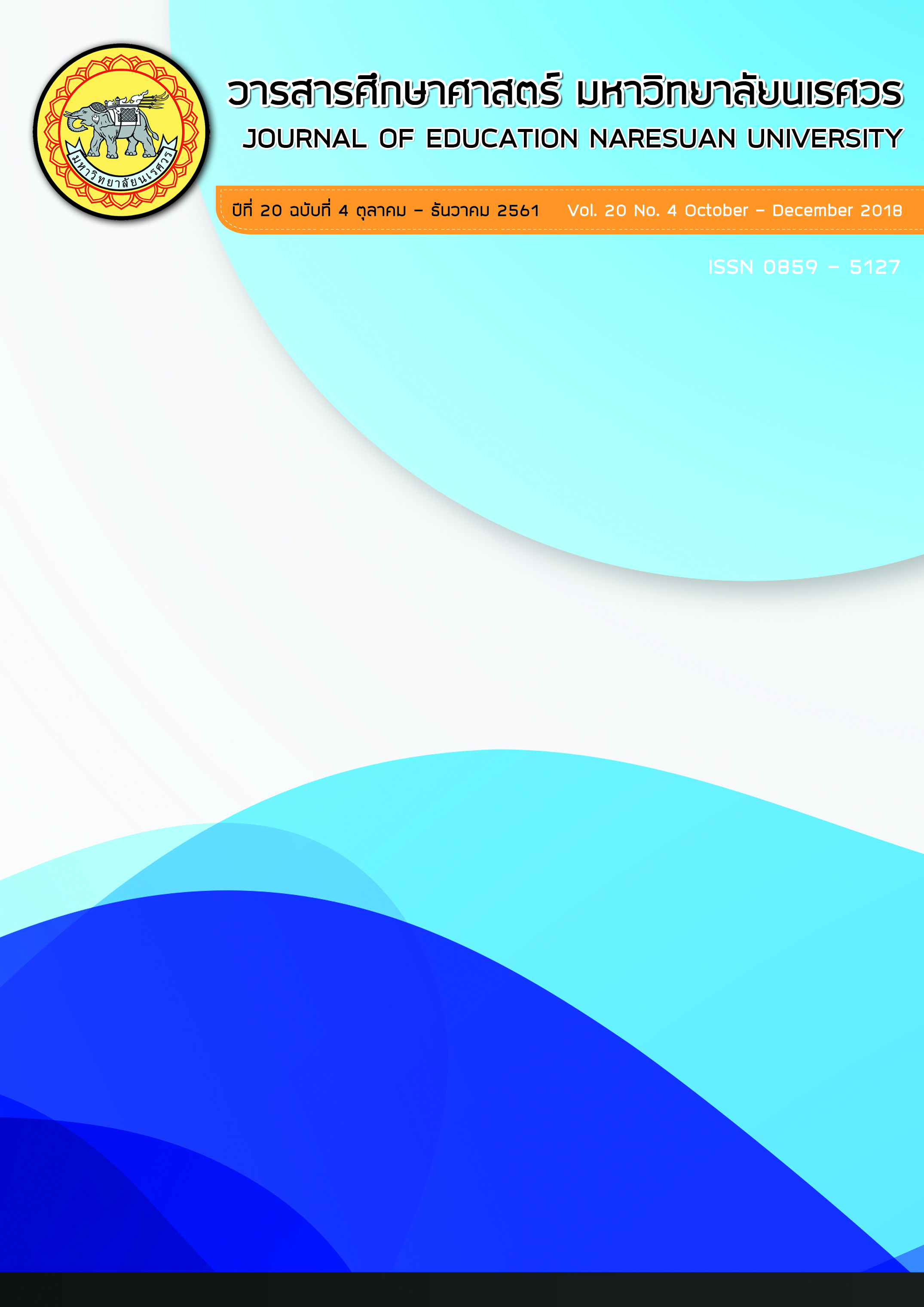การพัฒนารูปแบบการพัฒนาวิชาชีพแบบดูแลให้คำปรึกษาเพื่อพัฒนาความสามารถในการจัดการเรียนรู้สำหรับนิสิตฝึกประสบการณ์วิชาชีพครูที่ส่งเสริม ความสามารถในการคิดแก้ปัญหาของนักเรียน; THE DEVELOPMENT OF PROFESSIONAL MENTORING MODEL TO IMPROVE INSTRUCTIONAL
Main Article Content
Abstract
การวิจัยและพัฒนาครั้งนี้มีวัตถุประสงค์ เพื่อ 1) พัฒนารูปแบบการพัฒนาวิชาชีพแบบดูแลให้คำปรึกษา เพื่อพัฒนาความสามารถในการจัดการเรียนรู้ของนิสิตฝึกประสบการณ์วิชาชีพครูที่ส่งเสริมความสามารถในการคิดแก้ปัญหาของนักเรียน และ 2) ศึกษาผลการใช้รูปแบบ กลุ่มตัวอย่างที่ใช้ในการวิจัยครั้งนี้ ได้แก่ นักเรียนชั้นมัธยมศึกษาปีที่ 2 โรงเรียนสาธิตมหาวิทยาลัยศรีนครินทรวิโรฒ ประสานมิตร (ฝ่ายมัธยม) ภาคเรียนที่ 1 ปีการศึกษา 2557 จำนวน 1 ห้องเรียน จำนวนนักเรียน 47 คน ที่ได้จากการสุ่มแบบกลุ่ม (Cluster Random Sampling) และนิสิตฝึกประสบการณ์วิชาชีพครู สาขาวิชาคณิตศาสตร์ จำนวน 1 คน ซึ่งฝึกปฏิบัติการสอนวิชาคณิตศาสตร์ในชั้นมัธยมศึกษาปีที่ 2 ห้องที่เป็นกลุ่มตัวอย่าง เครื่องมือที่ใช้ในการวิจัยประกอบด้วย รูปแบบการพัฒนาวิชาชีพ แผนการจัดการเรียนรู้ แบบประเมิน แบบบันทึกการนิเทศ แบบบันทึกการสอนแบบพรรณนาความ (Journal Writing) แบบทดสอบและแบบสอบถาม วิเคราะห์ข้อมูลโดยการหาค่าเฉลี่ย ค่าเบี่ยงเบนมาตรฐาน การวิเคราะห์เนื้อหา ทดสอบสมมติฐานโดยใช้สถิติ One Sample t–test ผลการวิจัย พบว่า
1. รูปแบบการพัฒนาวิชาชีพแบบดูแลให้คำปรึกษา (Mentoring) เพื่อพัฒนาความสามารถในการจัดการเรียนรู้ที่ส่งเสริมความสามารถในการคิดแก้ปัญหา (AT_PSM Mentoring – 3PD Model) ซึ่งผู้วิจัยพัฒนามาจากรูปแบบการพัฒนาวิชาชีพแบบดูแลให้คำปรึกษาสำหรับนิสิตฝึกประสบการณ์วิชาชีพครู AT_PSM Mentoring Model (Cheusuwantavee, et al., 2016, pp. 281-295) ร่วมกับกระบวนการเรียนการสอนที่ส่งเสริมความสามารถในการคิดแก้ปัญหาของนักเรียน (3PD) มีองค์ประกอบ คือ หลักการ วัตถุประสงค์ กระบวนการพัฒนาวิชาชีพและเงื่อนไขความสำเร็จ กระบวนการพัฒนาวิชาชีพประกอบด้วย 5 ขั้น ได้แก่ ขั้นที่ 1 วิเคราะห์ความต้องการจำเป็นและกำหนดวัตถุประสงค์ (Analysis Need and Setting Objective: A) ขั้นที่ 2 ให้ความรู้ (Training: T) ขั้นที่ 3 ปฏิบัติการพัฒนาวิชาชีพ (Professional Development Practice: P) ซึ่งประกอบด้วย 1) การประชุมก่อนการสอน (Pre Conference) 2) การสังเกตการสอน (Observation) และ 3) การประชุมหลังสังเกตการสอน (Post Conference) ขั้นที่ 4 การเรียนรู้ด้วยตนเอง สร้างความเข้าใจและปรับปรุงแก้ไข (Self-Directed Learning and Self-Modifying: S) และขั้นที่ 5 การวัดประเมินผลและไตร่ตรองสะท้อนคิด (Measurement, Evaluation and Reflection: M) กระบวนการเรียนการสอนที่ส่งเสริมความสามารถในการคิดแก้ปัญหาของนักเรียน (3PD) ประกอบด้วย 4 ขั้น ได้แก่ ขั้นที่ 1 เตรียมความพร้อมและสร้างแรงจูงใจ (Preparation and Motivation: P) ขั้นที่ 2 เรียนรู้กระบวนการแก้ปัญหา (Process Learning: P) ขั้นที่ 3 ฝึกแก้ปัญหา (Practice: P) และขั้นที่ 4 อภิปรายและสะท้อนผลการเรียนรู้ (Discussion and Reflection: D) โดยรูปแบบ AT_PSM Mentoring– 3PD Model ผ่านการตรวจสอบคุณภาพด้านความสมเหตุสมผลเชิงทฤษฎี ความเป็นไปได้และความสอดคล้องของรูปแบบ โดยผู้เชี่ยวชาญ
2. ผลการใช้รูปแบบ พบว่า นิสิตฝึกประสบการณ์วิชาชีพครูมีความสามารถในการจัดการเรียนรู้ที่ส่งเสริมความสามารถในการคิดแก้ปัญหาหลังการใช้รูปแบบสูงกว่าก่อนการใช้รูปแบบ นักเรียนมีความสามารถในการคิดแก้ปัญหาหลังเรียนสูงกว่าเกณฑ์ร้อยละ 60 อย่างมีนัยสำคัญทางสถิติที่ระดับ.01 นิสิตฝึกประสบการณ์วิชาชีพครูมีความพึงพอใจต่อการใช้รูปแบบโดยภาพรวมอยู่ในระดับมากที่สุด ( = 4.95, S.D. = .23) และนักเรียนมีความคิดเห็นว่าการจัดการเรียนรู้ส่งเสริมความสามารถในการคิดแก้ปัญหาในระดับมาก (
= 4.14, S.D. = .29)
THE DEVELOPMENT OF PROFESSIONAL MENTORING MODEL TO IMPROVE INSTRUCTIONAL MANAGEMENT ABILITY FOR FIELD EXPERIENCE STUDENT TEACHERS ENHANCING PROBLEM SOLVING THINKING ABILITY OF STUDENTS
The purposes of this research and development were to: 1) develop and verify professional mentoring model to improve instructional management ability for field experience student teachers in which enhances problem solving thinking ability of students, and 2) study effects of using such Mentoring Model. The subjects were forty seven eighth grade students in the first semester of the 2014 academic year from Prasarnmit Demonstration School, Srinakharinwirot University by employing the cluster random sampling technique and 1 field experience student teacher. The research instruments were mentoring model that improve instructional ability for field experience student teachers in which enhances problem solving thinking ability of students, lesson plans, evaluation form, supervision journal writing, instructional journal writing, assessment test and questionnaire. Statistical analysis employed were mean, standard deviation, content analysis and one-sample t-test.
The research findings were:
1. The developed AT_PSM Mentoring –3PD Model consisted of principles, objectives, Professional Development process and condition of application. In term of Professional Development process included 5 steps: step 1 Analysis Need and Setting Objective (A); step 2 Training (T); step 3 Professional Development Practice (P) that consisted of 3 sub-steps; 1) Pre Conference, 2) Observation, 3) Post Conference; step 4 Self-directed learning and Self-Modifying (S); and step 5 Measurement, Evaluation and Reflection (M). The 3PD instructional process in which enhances problem solving thinking ability of students consisted of 4 steps as follows: 1) Preparation and motivation (P), 2) Process learning (P), 3) Practice (P), and 4) Discussion and reflection (D). The AT_PSM Mentoring – 3PD Model was verified to be effective as recommended by experts
2. Effects of using the mentoring Model: The field experience student teacher’s instructional ability enhancing problem solving thinking ability of student after implementation of the model were higher than before. Students’ problem solving thinking ability after implementation of the model were significantly higher than 60 percent criterion at .01 level of significance. The field experience student teacher Satisfied for implementation of the model at a highest level of agreement ( = 4.95, S.D. = .23), and the students agreed that the instruction could promote problem solving thinking ability at a high level of agreement (
= 4.14, S.D. = .29).
Article Details
The owner of the article does not copy or violate any of its copyright. If any copyright infringement occurs or prosecution, in any case, the Editorial Board is not involved in all the rights to the owner of the article to be performed.
References
Cheusuwantavee, C., Rueangsukanan, T., Keawamet, R., & Arthitwarakull, T. (2016). AT_PSM Mentoring Model: Professional development model for field experience student teachers. National and International Education Conference; “Curriculum Instruction and Supervision: Art Science and Technology toward the Education Quality and Creativity Civic for the 21st Century”. January 14 – 15, 2016. Faculty of Education, Silpakorn University, Nakhon Pathom, Thailand. (in Thai)
Glickman, C. D., et al. (2010). Supervision and instructional leadership: A developmental approach (8th ed.). Boston: Allyn and Bacon.
Institute for the Promotion of Teaching Science and Technology. (2008). Mathematical process skills (2nd ed.). Bangkok: S. Charoen Printing Public Company Limited. (in Thai)
Khammani, T. (2005). Instructional model: A wide variety of choices. Bangkok: Chulalongkorn University Press. (in Thai)
Kruekam-ai, W. (2009). The development of supervision model for field experience student teachers to improve instructional competency that enhances thinking skills of elementary school students (Doctoral dissertation). Bangkok: Silpakorn University. (in Thai)
Kruse, K. (2009). Introduction to Instructional Design and the ADDIE Model. Retrieved from www.transformativedesigns.com/id_systems.html
Laowreandee, W. (2013). Science of instructional supervision and coaching professional development. Nakhon Pathom: Silpakorn University. (in Thai)
Makanong, A. (2010). Mathematical skills and processes: Development/development. Bangkok: Faculty of Education, Chulalongkorn University. (in Thai)
Office of the Education Council. (1999). National Education Act 1999. Bangkok: Prikwarn Graphic. (in Thai)
Panich, W. (2012). Way of learning for students in the 21st century. Bangkok: Sodsri-Saridwongso Foundation. (in Thai)
Siridhrungsri, P. (2014). Improving the quality of Thai teachers in the 21st century. The Office of Social Promotion for Learning and Youth Quality. Educational Conference; " Great developing Learning ... to the turning point of Thailand" 6-8 May 2014. (in Thai)


